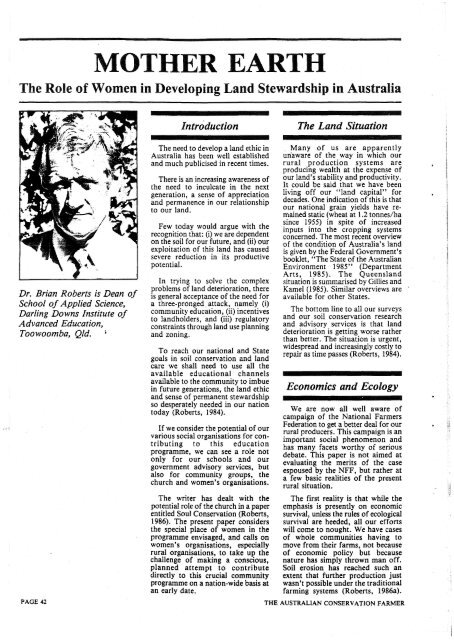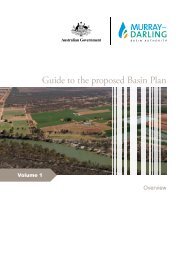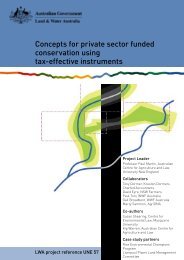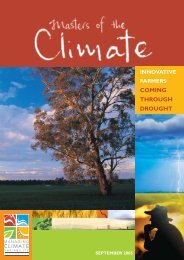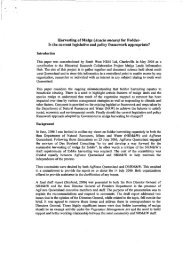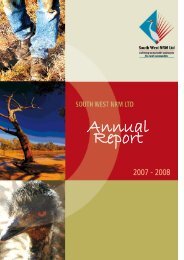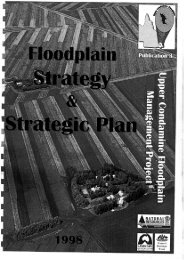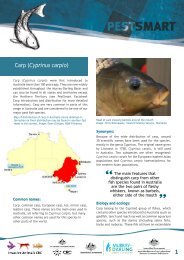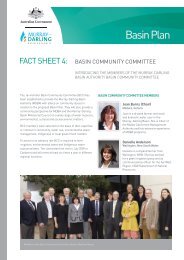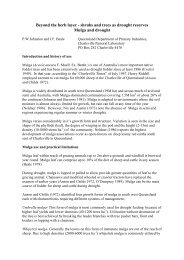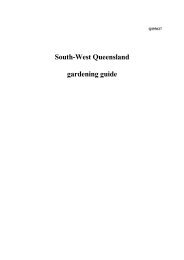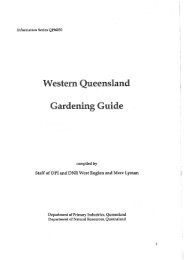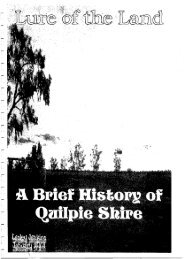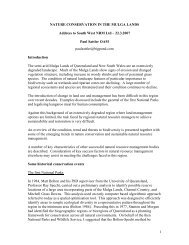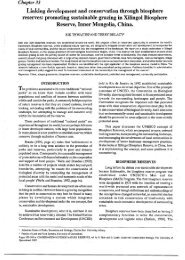soil-conservation-people-religion-and-land.pdf - South West NRM
soil-conservation-people-religion-and-land.pdf - South West NRM
soil-conservation-people-religion-and-land.pdf - South West NRM
You also want an ePaper? Increase the reach of your titles
YUMPU automatically turns print PDFs into web optimized ePapers that Google loves.
OTHEREARTH<br />
The Role of Women in Developing L<strong>and</strong> Stewardship in Australia<br />
- --<br />
The L<strong>and</strong> Situation<br />
Dr. Brian Roberts is Dean of<br />
School of Applied Science,<br />
Darling Downs Institute of<br />
Advanced Education,<br />
Toowoomba, Qld.<br />
PAGE 42<br />
The need to develop a l<strong>and</strong> ethic in<br />
Australia has been well established<br />
<strong>and</strong> much publicised in recent times.<br />
There is an increasing awareness of<br />
the need to inculcate in the next<br />
generation, a sense of appreciation<br />
<strong>and</strong> permanence in our relationship<br />
to our l<strong>and</strong>.<br />
Few today would argue with the<br />
recognition that: (i) we are dependent<br />
on the <strong>soil</strong> for our future, <strong>and</strong> (ii) our<br />
exploitation of this l<strong>and</strong> has caused<br />
severe reduction in its productive<br />
potential.<br />
In trying to solve the complex<br />
problems of l<strong>and</strong> deterioration, there<br />
is general acceptance of the need for<br />
a three-pronged attack, namely (i)<br />
community education, (ii) incentives<br />
to l<strong>and</strong>holders, <strong>and</strong> (iii) regulatory<br />
constraints through l<strong>and</strong> use planning<br />
<strong>and</strong> zoning.<br />
To reach our national <strong>and</strong> State<br />
goals in <strong>soil</strong> <strong>conservation</strong> <strong>and</strong> l<strong>and</strong><br />
care we shall need to use all the<br />
available educational channels<br />
available to the community to imbue<br />
in future generations, the l<strong>and</strong> ethic<br />
<strong>and</strong> sense of permanent stewardship<br />
so desperately needed in our nation<br />
today (Roberts, 1984).<br />
If we consider the potential of our<br />
various social organisations for contributing<br />
to this education<br />
programme, we can see a role not<br />
only for our schools <strong>and</strong> our<br />
government advisory services, but<br />
also for community groups, the<br />
church <strong>and</strong> women's organisations.<br />
Many of us are apparently<br />
unaware of the way in which our<br />
rural production systems are<br />
producing wealth at the expense of<br />
our l<strong>and</strong>'s stability <strong>and</strong> productivity.<br />
It could be said that we have been<br />
living off our "l<strong>and</strong> capital" for<br />
decades. One indication of this is that<br />
our national grain yields have remained<br />
static (wheat at 1.2 tonnes/ha<br />
since 1955) in spite of increased<br />
inputs into the cropping systems<br />
concerned. The most recent overview<br />
of the condition of Australia's l<strong>and</strong><br />
is given by the Federal Government's<br />
booklet, "The State of the Australian<br />
Environment 1985" (Department<br />
Arts, 1985). The Queensl<strong>and</strong><br />
situation is summarised by Gillies <strong>and</strong><br />
Kame1 (1985). Similar overviews are *<br />
available for other States.<br />
The bottom line to all our surveys<br />
<strong>and</strong> our <strong>soil</strong> <strong>conservation</strong> research<br />
<strong>and</strong> advisory services is that l<strong>and</strong><br />
deterioration is getting worse rather<br />
than better. The situation is urgent,<br />
widespread <strong>and</strong> increasingly costly to<br />
repair as time passes (Roberts, 1984).<br />
Economics <strong>and</strong> Ecology<br />
We are now all well aware of<br />
campaign of the National Farmers<br />
~ederation to get a better deal for our<br />
rural producers. This campaign is an<br />
important social phenomenon <strong>and</strong><br />
has many facets worthy of serious<br />
debate. This paper is not aimed at<br />
evaluating the merits of the case<br />
espoused by the NFF, but rather at<br />
a few basic realities of the present<br />
rural situation.<br />
The writer has dealt with the The first reality is that while the<br />
potential role of the church in a paper emphasis is presently on economic<br />
entitled Soul Conservation (Robens, survival, unless the rules of ecological<br />
1986). The present paper considers survival are heeded, all our efforts<br />
the special place of women in the will come to nought. We have cases<br />
programme envisaged, <strong>and</strong> calls on of whole communities having to<br />
women's organisations, especially move from their farms, not because<br />
rural organisations, to take up the of economic policy but because<br />
challenge of making a conscious, nature has simply thrown man off.<br />
planned attempt to contribute Soil erosion has reached such an<br />
directly to this crucial community extent that further production just<br />
programme on a nation-wide basis at wasn't possible under the traditional<br />
an early date.<br />
farming systems (Roberts, 1986a).<br />
THE AUSTRALIAN CONSERVATION FARMER


